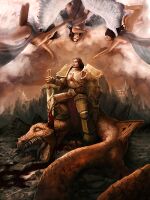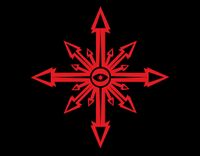/tg/ Heresy Timeline: Difference between revisions
1d4chan>Lumey |
1d4chan>Lumey |
||
| Line 5: | Line 5: | ||
{{Main|Unification Wars (Hektor Heresy)}} | {{Main|Unification Wars (Hektor Heresy)}} | ||
After the Fall of the Eldar and the Birth of Slaanesh, the long | [[File:Emperor of mankind by esoluna-d307owr.jpg|right|150px]] | ||
After the '''Fall of the Eldar''' and the '''Birth of Slaanesh''', the long Warp Storms that had blighted the [[Galaxy (Hektor Heresy)|Galaxy]] receded. The Emperor began to unfurl His plans to unify the human race and extend its dominion to the stars, beginning by conquering Terra itself. In this period the last Terran church was eliminated, making way for the Imperial Truth's doctrine of rationalism and atheism. The Emperor's forces would also overcome the forces of the '''Techno-Barbarian''' states that had long warred over humanity's cradle. | |||
Much of the fighting was undertaken by the doomed '''Thunder Warriors''', but the Emperor also implemented the great '''Primarch Project''' to craft super-human generals and statesmen to spearhead his Great Crusade. When all but one of the Primarchs was lost, the Emperor improvised the Space Marines from the genome of his lost creations. This new generation of enhanced warriors would form the '''Sacred Band''' of Hektor Cincinnatus, and as their numbers swelled would be divided into the [[Legiones Astartes (Hektor Heresy)|Legiones Astartes]]. | |||
In the last years of the Unification Wars, the fighting would spread to Luna. The conquest of the sophisticated gene-forges of the moon allowed for a great increase in the number of Space Marines. | |||
==798.M30 to 005.M31: The Great Crusade== | ==798.M30 to 005.M31: The Great Crusade== | ||
Revision as of 00:44, 2 March 2015
This page details people, events, and organisations from the /tg/ Heresy, a fan re-working of the Warhammer 40,000 Universe. See the /tg/ Heresy Timeline and Galaxy pages for more information on the Alternate Universe.
Pre-Heresy
mid-M30: The Unification Wars

After the Fall of the Eldar and the Birth of Slaanesh, the long Warp Storms that had blighted the Galaxy receded. The Emperor began to unfurl His plans to unify the human race and extend its dominion to the stars, beginning by conquering Terra itself. In this period the last Terran church was eliminated, making way for the Imperial Truth's doctrine of rationalism and atheism. The Emperor's forces would also overcome the forces of the Techno-Barbarian states that had long warred over humanity's cradle.
Much of the fighting was undertaken by the doomed Thunder Warriors, but the Emperor also implemented the great Primarch Project to craft super-human generals and statesmen to spearhead his Great Crusade. When all but one of the Primarchs was lost, the Emperor improvised the Space Marines from the genome of his lost creations. This new generation of enhanced warriors would form the Sacred Band of Hektor Cincinnatus, and as their numbers swelled would be divided into the Legiones Astartes.
In the last years of the Unification Wars, the fighting would spread to Luna. The conquest of the sophisticated gene-forges of the moon allowed for a great increase in the number of Space Marines.
798.M30 to 005.M31: The Great Crusade

Following His victory in the Unification Wars, the Emperor launched an immense campaign to unite the scattered human race. His mighty Space Marine Legions would play the foremost role in the Great Crusade, but they were accompanied by the auxiliary formations of the Imperial Army. The Treaty of Mars in 805.M30 brought the Adeptus Mechanicum and the warhosts of the Taghmata Omnissiah into the Crusade.
The Great Crusade would end neither in victory nor defeat, but in treachery and civil war. The Warmaster Hektor Cincinnatus took up arms against the government of the Imperium and allied himself with the Ruinous Powers of Chaos, beginning a horrific war that would leave trillions dead.
005.M31 to 014.M31: The Hektor Heresy

Hektor had won the allegiance of half the Space Marine Legions and their supporting Imperial army formations. He could also rely upon the Dark Mechanicum, tech heretics to the Cult of Mars who commanded many Titan Legions and Knight Households, along with lesser Skitarii and Legio Cybernetica units. These Traitor forces held the initiative at the start of the campaign. The Warmaster had seen to it that many of the Legions he expected to side with the Emperor were positioned near the rim of the Galaxy, and struck hard at the Loyalists still within reach.
However, the courage and determination of the Emperor's Loyalists held up Hektor's forces long enough that the Warmaster had to risk his whole campaign on a desperate gamble or be crushed for sure by the arrival of the once-distant Legions. In the end Hektor was slain by the Emperor and his rebellion defeated, but he inflicted grievous wounds on the Imperium and her master.
Post-Heresy
The Great Scourging
The Void Angels, The Crusaders, Silver Cataphracts, and Steel Marshals are the big players in the Imperium's counter-offensive. Three of the Traitor Legions go down hard in big battles. The Gorgers are left behind as a rear-guard and face the full fury of the counter-attacking Loyalists, while the Life Bringers fight the Entombed, bolstered by Void Angels, at The Battle of Rai. The Bulwark face the Steel Marshals and Silver Cataphracts in a brutal battle known as The Crucible. Others flee and leave their homeworlds to get razed. The Mastodontii abandon Tisenjoch to the mercy of the Silver Cataphracts and Void Angels.
Imperial Reformation
Arelex Orannis reorganises the administration of the Imperium. Meanwhile, Darius Cyaxares persuades the Primarchs to break up the Legions Astartes into the Space Marine Chapters. The rules governing the Chapters are known at the Institutorum Astartes and are written by Thomas Gaudin (ethics), Gaspard Lumey (military organisation), and Darius Cyaxares (the Librarium).